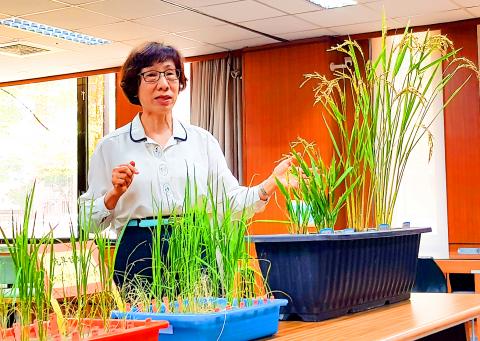A team of Academia Sinica researchers yesterday unveiled a mechanism to enhance the environmental stress tolerance of rice plants by regulating enzymatic and sugary expression, saying that it would improve rice production under extreme weather conditions.
As rice is the staple food for nearly half of the global population, improving its production and resistance to environmental challenges is crucial, Institute of Molecular Biology distinguished research fellow Yu Su-may (余淑美) told a news conference in Taipei.
The issue has become more pressing, as the world’s population is expected to exceed 9 billion by 2050.

Photo: Chien Hui-ju, Taipei Times
In addition to population growth, other challenges to rice production include extreme weather, such as heat waves and inadequate water supplies for agricultural use, she said.
To improve rice production, the team found that the key is regulation of the expression of the enzyme alpha-amylase, which hydrolyzes starch into sugars in plants and is induced by sugar starvation and repressed by sugar provision, Yu said.
The process can be regulated by adjusting the functions of two proteins called MYBS1 and MYBS2, which are transcription factors competing to bind to the enzyme to either promote or repress its sugar induction, she said.
Under a low sugar level, MYBS1 will enter cell nuclei to promote alpha-amylase’s expression, while MYBS2 will restrict its expression when the sugar level is high, Yu said.
When MYBS2 is suppressed in a dry and hot environment, the enzyme alpha-amylase is induced to hydrolyze starch in sugars, she said.
After nearly six years of research, the team found — using gene editing techniques — that controlling the expressions of MYBS2 and alpha-amylase in rice plants can enhance their production and stress resistance, she added.
Gene-edited rice plants are 1.5 larger than non-modified plants, and they can survive in temperatures up to 42°C and with 20 percent less water, Yu said.
However, whether the gene editing technique influences the nutrition and flavor of rice requires more research, she said.
Other team members include David Ho (賀端華), a distinguished research fellow at Academia Sinica’s Institute of Plant and Microbial Biology, and Lu Chung-an (陸重安), associate professor at the National Central University’s Department of Life Sciences.
Their findings were published on Oct. 22 in the journal Proceedings of the National Academy of Sciences of the United States of America.

Alain Robert, known as the "French Spider-Man," praised Alex Honnold as exceptionally well-prepared after the US climber completed a free solo ascent of Taipei 101 yesterday. Robert said Honnold's ascent of the 508m-tall skyscraper in just more than one-and-a-half hours without using safety ropes or equipment was a remarkable achievement. "This is my life," he said in an interview conducted in French, adding that he liked the feeling of being "on the edge of danger." The 63-year-old Frenchman climbed Taipei 101 using ropes in December 2004, taking about four hours to reach the top. On a one-to-10 scale of difficulty, Robert said Taipei 101

Nipah virus infection is to be officially listed as a category 5 notifiable infectious disease in Taiwan in March, while clinical treatment guidelines are being formulated, the Centers for Disease Control (CDC) said yesterday. With Nipah infections being reported in other countries and considering its relatively high fatality rate, the centers on Jan. 16 announced that it would be listed as a notifiable infectious disease to bolster the nation’s systematic early warning system and increase public awareness, the CDC said. Bangladesh reported four fatal cases last year in separate districts, with three linked to raw date palm sap consumption, CDC Epidemic Intelligence

US climber Alex Honnold left Taiwan this morning a day after completing a free-solo ascent of Taipei 101, a feat that drew cheers from onlookers and gained widespread international attention. Honnold yesterday scaled the 101-story skyscraper without a rope or safety harness. The climb — the highest urban free-solo ascent ever attempted — took just more than 90 minutes and was streamed live on Netflix. It was covered by major international news outlets including CNN, the New York Times, the Guardian and the Wall Street Journal. As Honnold prepared to leave Taiwan today, he attracted a crowd when he and his wife, Sanni,

Two Taiwanese prosecutors were questioned by Chinese security personnel at their hotel during a trip to China’s Henan Province this month, the Mainland Affairs Council (MAC) said yesterday. The officers had personal information on the prosecutors, including “when they were assigned to their posts, their work locations and job titles,” MAC Deputy Minister and spokesman Liang Wen-chieh (梁文傑) said. On top of asking about their agencies and positions, the officers also questioned the prosecutors about the Cross-Strait Joint Crime-Fighting and Judicial Mutual Assistance Agreement, a pact that serves as the framework for Taiwan-China cooperation on combating crime and providing judicial assistance, Liang